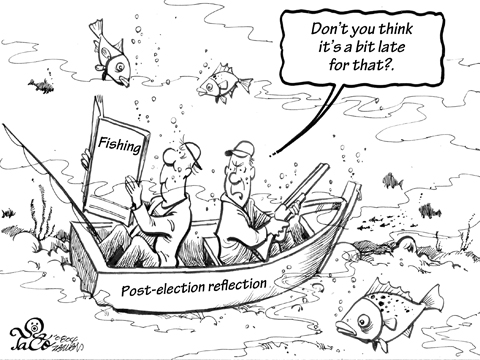¡@

¡@
¡@
Cure worse
than the disease
Monday, Apr 07, 2008, Page 8
At first glance, a government united ¡X as opposed to divided ¡X would seem to be
diplomatically stronger in dealing with foreign nations.
That might not hold true when it comes to Taiwan¡¦s interaction with China,
especially with the government in the hands of the Chinese Nationalist Party (KMT),
the party whose ultimate goal is unifying Taiwan with China. The KMT¡¦s hand is
further weakened by the must-do list of president-elect Ma Ying-jeou (°¨^¤E).
Worse still, the KMT, by virtue of its control of all branches of government,
would run out of excuses for not complying with Beijing¡¦s wishes given the
alliance pact that former KMT chairman Lien Chan formed with the Chinese
Communist Party. Beijing¡¦s heightened expectations could spell disaster for the
Taiwanese.
As soon as Ma scored a resounding victory over Democratic Progressive Party
candidate Frank Hsieh (Áªø§Ê), he floated the balloon of the dual interpretation
of ¡§one China¡¨ as a basis for cross-strait talks aimed at bringing about direct
links.
Three days later in a telephone conversation with US President George W. Bush,
Chinese President Hu Jintao (JÀAÀÜ) echoed Ma¡¦s idea with rare enthusiasm.
The fact remains that, while Beijing is encouraging Ma to snow the Taiwanese
with his fairytale world of the existence of a Republic of China (ROC) that
encompasses modern-day Mongolia, Taiwan and China, direct links would only be
possible if Ma formally agrees to Beijing¡¦s ¡§one China¡¨ policy or agrees that
the links are ¡§domestic¡¨ in nature.
Beijing¡¦s policy stipulates that there is ¡§one China,¡¨ which goes by the name of
the People¡¦s Republic of China (PRC), and that Taiwan is part of China.
Ma¡¦s consent would be instrumental in taking the first step to conceding
Taiwan¡¦s sovereignty to Beijing and thus making the US¡¦ Taiwan Relations Act
groundless as the nation is transformed into a ¡§domestic¡¨ region of China.
During the presidential race, Ma agreed that Taiwan is a sovereign nation and
that the 23 million Taiwanese have the sole right to decide the fate of the
nation¡¦s future status. It should follow that a referendum on unification would
have to be conducted and affirmed before formal agreement on direct links can be
inked, inconsistent with Ma¡¦s guarantee of realizing direct links within one
year of taking office.
The road to a formal peace accord might likewise be replete with insurmountable
hurdles, not the least of which could be the prerequisite of implementing
China¡¦s ¡§Anti-Secession¡¨ Law in Taiwan. That would inevitably destabilize Taiwan
for years.
Ma¡¦s prescriptions for Taiwan¡¦s perceived economic ills carry grim side effects.
Nevertheless, direct links and a peace accord would constitute the backbone by
which Ma would forge a cross-strait common market to provide Taiwan with lasting
and painless economic prosperity. Such a feat would be comparable to Ma ¡X with
Taiwan in tow ¡X walking on water.
Given that Taiwan does not deserve to sink even though many voters were
convinced they should entrust Ma with these impossible tasks, Taiwanese might
just welcome a jettison of these unattainable plans now that the election is
over.
But the KMT holds a strong hand when dealing for itself within the scope of
Beijing¡¦s ¡§one China.¡¨
Huang Jei-hsuan
California
¡@